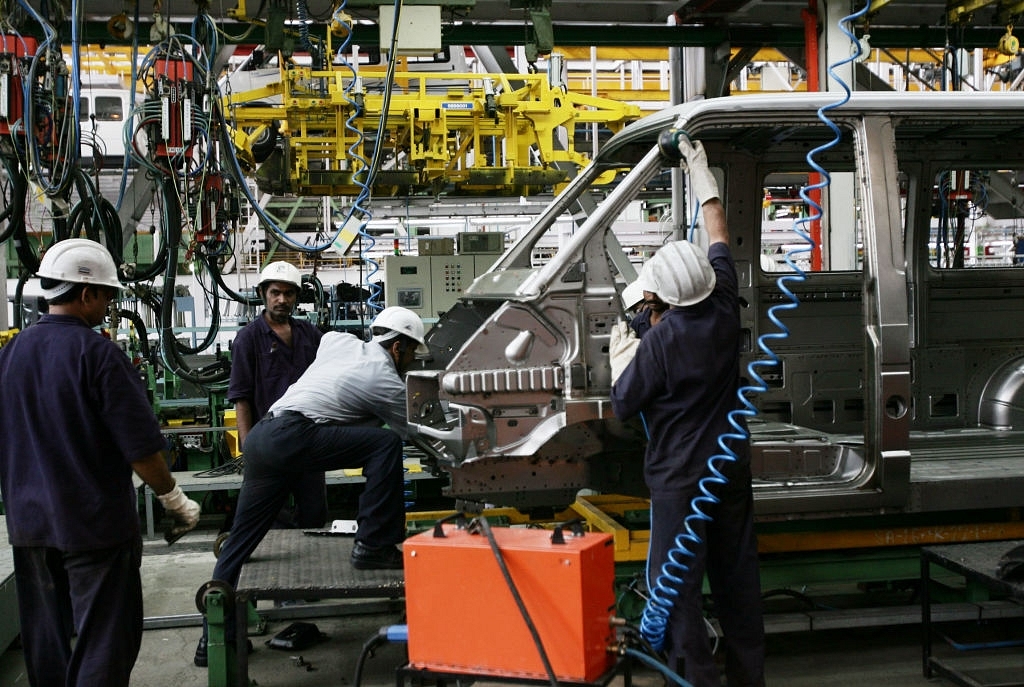Ideas
Judiciary’s Poor Record On Enforcement Of Contracts Is Dragging India Down On Ease Of Doing Business
- Enforcing contracts and property registration are our worst performers on the ease of doing business scale.
- Time for a serious look at these aspects and ushering in reforms.

An automobile factory in India. (Manoj Patil/Hindustan Times via Getty Images)
If there is one institution which should be ashamed of itself despite the 23-point jump in India’s overall rank from 100 to 77 in the Ease of Doing Business 2019, it is the judiciary. If you want to add one more institution to this, it should be the state-level property registration authorities.
India has been an outperformer globally in terms of the improvements shown over the last four years of the Narendra Modi government, rising from an overall rank of 142 in the last year of United Progressive Alliance in 2014 to 77 now. This is almost entirely due to the heavy emphasis placed by the Prime Minister on making India easier for doing business. The Department of Industrial Policy and Promotion (DIPP) needs particular praise for egging states on to ease rules and regulations so as to improve their own internal ease of business rankings.
Of the 10 parameters on which the rankings were done, India improved in six of them and slipped on four. We improved our rankings on the following parameters: dealing with construction permits (a pole vault from rank 181 in 2018 to 52 now), starting a business (156 to 137), trading across borders (146 to 80), getting credit (29 to 22), getting electricity connections (29 to 24) and enforcing contracts (barely visible, from 164 to 163).
We have slipped on protecting minority investors (rank 4 to 7), paying taxes (119 to 121), resolving insolvency (103 to 108), and registering property (154 to 166).
Two points are worth making before we analyse the real serious issues thrown up in this ranking.
In theory, any improvement – even of one rank – should be lauded. And so, the improvement in India’s rank on enforcing contracts from 164 to 163 need not be derided. But is 163 something the lower judiciary should be proud of when it is a mile away from the overall country rank of 77?
Second, when we can make such dramatic progress on reforms in the handing out of construction permits, or trading across borders, or even starting a business, how is this marginal improvement anything more than a statistical aberration?
Worse, we have slipped badly on registering property, from an already bad rank of 154 in 2018 to 166 now. Property registration is largely a state subject, and hence not amenable to solutions from the Centre. Anecdotally, we know that property registration offices are often dens of corruption, and state politicians prefer to keep them that way since this is a source for illegal gratification for netas and babus. Clearly, states need to clean up the mess.
Between them, these two heads – enforcing contracts and property registration – are our worst performers on the ease of doing business scale. The rule of law insofar as it pertains to business means enforcing contracts. And if our lower courts, which is where contract disputes are first heard, are going to drag us down, it is time they were pulled up by the higher judiciary, and state and central governments.
The Indian judiciary, by its tardiness, is making doing business difficult. We have one of these two problems, or both. Either lower-level judicial officers are not good enough to deal with contract law, or their processes are too tardy to be of use in enforcing contracts. Time for a serious look at these aspects and ushering in reforms.
Support Swarajya's 50 Ground Reports Project & Sponsor A Story
Every general election Swarajya does a 50 ground reports project.
Aimed only at serious readers and those who appreciate the nuances of political undercurrents, the project provides a sense of India's electoral landscape. As you know, these reports are produced after considerable investment of travel, time and effort on the ground.
This time too we've kicked off the project in style and have covered over 30 constituencies already. If you're someone who appreciates such work and have enjoyed our coverage please consider sponsoring a ground report for just Rs 2999 to Rs 19,999 - it goes a long way in helping us produce more quality reportage.
You can also back this project by becoming a subscriber for as little as Rs 999 - so do click on this links and choose a plan that suits you and back us.
Click below to contribute.
Latest